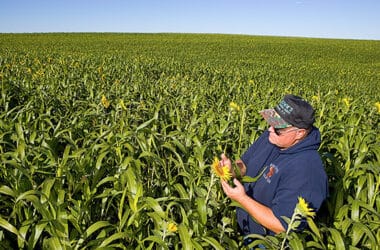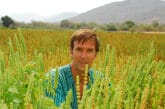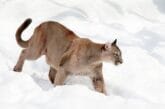Ocean acidification, the lesser-known twin of climate change, threatens to scramble marine life on a scale almost too big to fathom. Scientists fear changing ocean chemistry will drive the collapse of Alaska’s iconic crab fishery. Watch the video from PBS NewsHour and the Seattle Times.


Changing Ocean Chemistry Threatens Alaskan Crabs
Fishermen have found fortune and adventure in the frigid waters of the Bering Sea. But ocean acidification caused by carbon emissions has begun to alter the chemistry of the North Pacific, posing a threat for Alaska’s crabs. PBS NewsHour’s Ray Suarez reports in collaboration with the Pulitzer Center on Crisis Reporting and The Seattle Times.
When CO2 mixes with water it takes on a corrosive power that erodes some animals’ shells or skeletons. It lowers the pH, making oceans more acidic and sour, and robs the water of ingredients animals use to grow shells in the first place. — Craig Welch, Seattle Times
httpvh://youtu.be/En9PLxoG80w
The chemistry of the North Pacific Ocean is changing in ways that pose serious threats to Alaska’s two signature crab species: the red king crab and the snow crab. The culprit is ocean acidification.
Already, the oceans have grown 30 percent more acidic since the dawn of the industrial revolution — 15 percent just since the 1990s. By the end of this century, scientists predict, seas may be 150 percent more acidic than they were in the 18th century.
The oceans are corroding faster than they did during past periods of marine extinctions that were linked to souring seas. Even 55 million years ago, the rate of change was 10 times slower than today. The current shift has come so quickly that scientists five years ago saw chemical changes off the West Coast not expected for half a century. — Craig Welch
STORY: Climate Warming Catastrophe, Mass Extinctions Underway
This report, produced in partnership with the Pulitzer Center and the Seattle Times, is the first of a three-part PBS NewsHour series on the unexpected consequences of climate change called “Coping with Climate Change: Arctic Thaw.”
Read the full article by Craig Welch and photography by Steve Ringman in The Seattle Times.









Pingback: Planet Ocean: Land and Seas as One Ecosystem | WilderUtopia.com
Pingback: Disappearing Cod: Long-Term Ban Necessary | WilderUtopia.com
Stella Eidt: “What can I do???”
We need a just transition away from fossil fuels. We as individuals can drive less and take public transportation/walk/bike or drive more efficiently or use alternative fuels, buy less stuff and conserve more. We should also support political candidates who are committed to taking action by regulating and taxing and maybe even shutting down the most polluting fossil fuel industries as well as industrial agriculture and animal operations. We need movements of regular people to push the government to make life difficult for the industries that are dumping their greenhouse gas wastes into the atmosphere and totally destabilizing the ocean.
Pingback: California Sea Lion Suffer Warming Pacific | WilderUtopia.com
Pingback: Manager-Supervisors – Fishery Workers - Recent Jobs & Vacancies Available